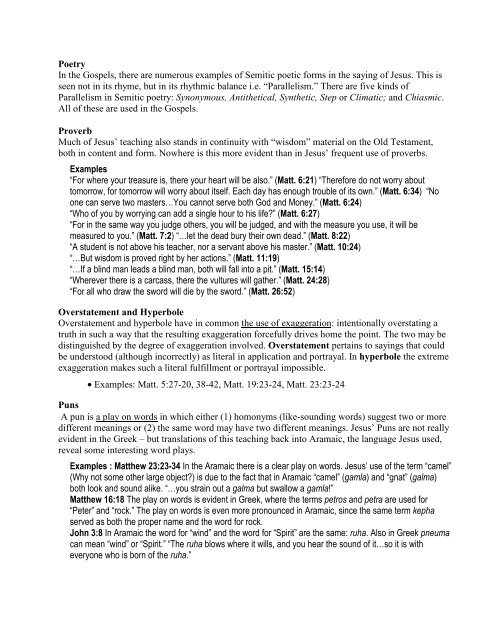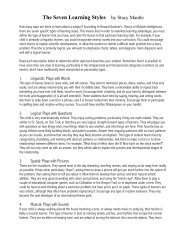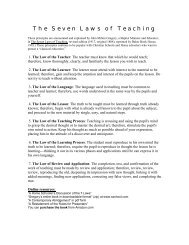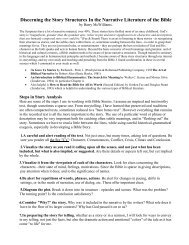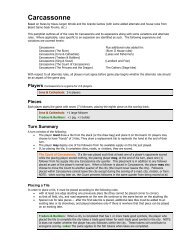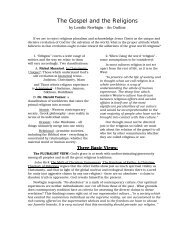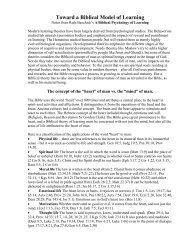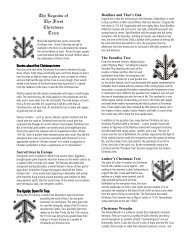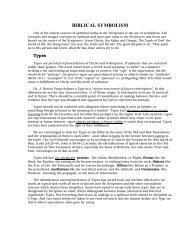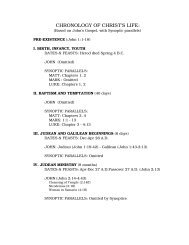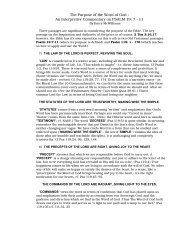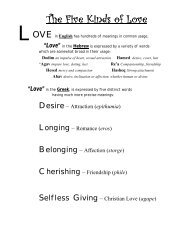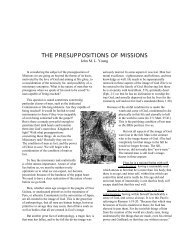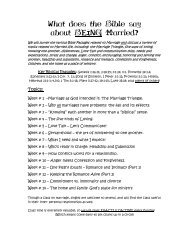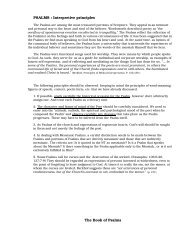Jesus' Use of Figurative Language - Eldrbarry's Story Telling Page
Jesus' Use of Figurative Language - Eldrbarry's Story Telling Page
Jesus' Use of Figurative Language - Eldrbarry's Story Telling Page
You also want an ePaper? Increase the reach of your titles
YUMPU automatically turns print PDFs into web optimized ePapers that Google loves.
Poetry<br />
In the Gospels, there are numerous examples <strong>of</strong> Semitic poetic forms in the saying <strong>of</strong> Jesus. This is<br />
seen not in its rhyme, but in its rhythmic balance i.e. “Parallelism.” There are five kinds <strong>of</strong><br />
Parallelism in Semitic poetry: Synonymous, Antithetical, Synthetic, Step or Climatic; and Chiasmic.<br />
All <strong>of</strong> these are used in the Gospels.<br />
Proverb<br />
Much <strong>of</strong> Jesus’ teaching also stands in continuity with “wisdom” material on the Old Testament,<br />
both in content and form. Nowhere is this more evident than in Jesus’ frequent use <strong>of</strong> proverbs.<br />
Examples<br />
“For where your treasure is, there your heart will be also.” (Matt. 6:21) “Therefore do not worry about<br />
tomorrow, for tomorrow will worry about itself. Each day has enough trouble <strong>of</strong> its own.” (Matt. 6:34) “No<br />
one can serve two masters…You cannot serve both God and Money.” (Matt. 6:24)<br />
“Who <strong>of</strong> you by worrying can add a single hour to his life?” (Matt. 6:27)<br />
“For in the same way you judge others, you will be judged, and with the measure you use, it will be<br />
measured to you.” (Matt. 7:2) “…let the dead bury their own dead.” (Matt. 8:22)<br />
“A student is not above his teacher, nor a servant above his master.” (Matt. 10:24)<br />
“…But wisdom is proved right by her actions.” (Matt. 11:19)<br />
“…If a blind man leads a blind man, both will fall into a pit.” (Matt. 15:14)<br />
“Wherever there is a carcass, there the vultures will gather.” (Matt. 24:28)<br />
“For all who draw the sword will die by the sword.” (Matt. 26:52)<br />
Overstatement and Hyperbole<br />
Overstatement and hyperbole have in common the use <strong>of</strong> exaggeration: intentionally overstating a<br />
truth in such a way that the resulting exaggeration forcefully drives home the point. The two may be<br />
distinguished by the degree <strong>of</strong> exaggeration involved. Overstatement pertains to sayings that could<br />
be understood (although incorrectly) as literal in application and portrayal. In hyperbole the extreme<br />
exaggeration makes such a literal fulfillment or portrayal impossible.<br />
• Examples: Matt. 5:27-20, 38-42, Matt. 19:23-24, Matt. 23:23-24<br />
Puns<br />
A pun is a play on words in which either (1) homonyms (like-sounding words) suggest two or more<br />
different meanings or (2) the same word may have two different meanings. Jesus’ Puns are not really<br />
evident in the Greek – but translations <strong>of</strong> this teaching back into Aramaic, the language Jesus used,<br />
reveal some interesting word plays.<br />
Examples : Matthew 23:23-34 In the Aramaic there is a clear play on words. Jesus’ use <strong>of</strong> the term “camel”<br />
(Why not some other large object?) is due to the fact that in Aramaic “camel” (gamla) and “gnat” (galma)<br />
both look and sound alike. “…you strain out a galma but swallow a gamla!”<br />
Matthew 16:18 The play on words is evident in Greek, where the terms petros and petra are used for<br />
“Peter” and “rock.” The play on words is even more pronounced in Aramaic, since the same term kepha<br />
served as both the proper name and the word for rock.<br />
John 3:8 In Aramaic the word for “wind” and the word for “Spirit” are the same: ruha. Also in Greek pneuma<br />
can mean “wind” or “Spirit.” “The ruha blows where it wills, and you hear the sound <strong>of</strong> it…so it is with<br />
everyone who is born <strong>of</strong> the ruha.”


